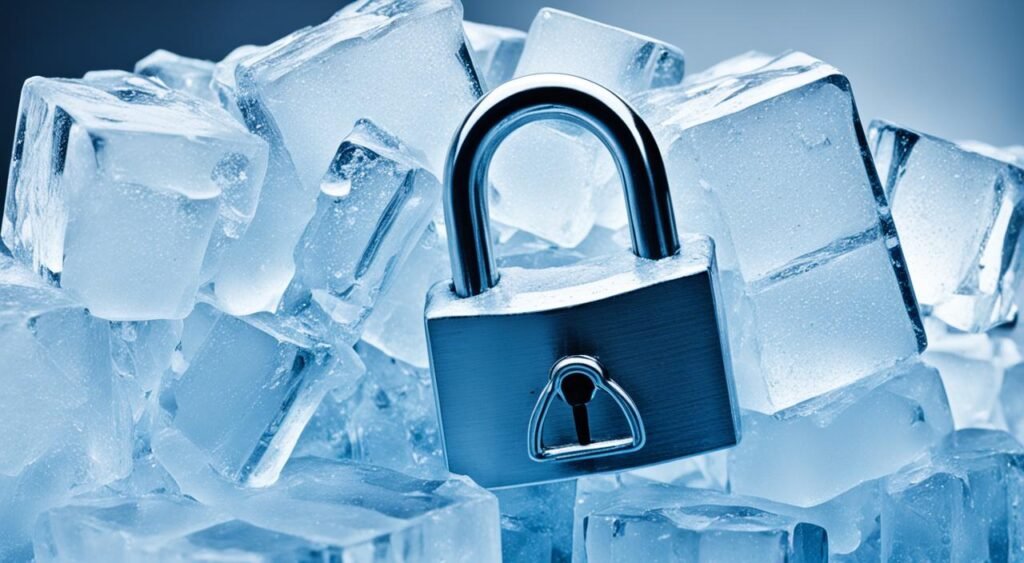What Is A Credit Freeze And How Does It Work?
When you place a security freeze, also known as a credit freeze, creditors can’t see your credit report. This stops them from opening new credit accounts in your name, whether they’re real or fake. You can freeze your credit by reaching out to the three big credit agencies – Equifax, Experian, and TransUnion. This action is free and shields you from identity theft by keeping your credit reports safe.
Key Takeaways
- A credit freeze blocks access to your credit report, preventing new credit accounts from being opened in your name.
- You can place a credit freeze by contacting the three major credit bureaus – Equifax, Experian, and TransUnion.
- Credit freezes are free and can help protect you from identity theft.
- The credit bureaus must freeze your credit report within one business day if the request is made online or by phone, or within three business days if the request is made by mail.
- To unfreeze your credit, the agencies must lift the freeze within one hour if the request is made online or by phone, or within three business days if the request is made by mail.
What Is a Credit Freeze
A credit freeze, also known as a security freeze, is a way to protect your credit reports from unauthorized access. When you freeze your credit, creditors can’t see your credit file. This stops them from approving new credit accounts in your name, whether they’re real or fake.
This method is a strong defense against identity theft. It makes it hard for someone to open new credit accounts with your info. This can save you from the trouble and financial loss of identity fraud.
How a Credit Freeze Works
Freezing your credit means locking down your reports with the three big credit bureaus: Experian, Equifax, and TransUnion. This stops creditors from checking your credit file and approving new credit applications in your name.
- The freeze stays on until you decide to lift it, either for a short time or forever.
- Lifting the freeze lets you access your credit reports again. You can do this when you’re applying for new credit, a job, or a place to live.
- A credit freeze doesn’t touch your current credit accounts or your credit score. It just stops new accounts from being opened.
Freezing your credit is a smart way to protect your credit and personal info. It lowers the risk of identity theft and financial fraud.
Placing or Lifting a Credit Freeze
If you’ve been a victim of identity theft or want to protect your credit, consider a security freeze on your credit file. This action, known as a credit freeze, stops creditors from seeing your credit report. It blocks new lines of credit from being opened in your name.
To place a credit freeze, reach out to the three main credit reporting agencies – Equifax, Experian, and TransUnion. You can contact them online, by phone, or by mail. It’s free for consumers, and you’ll get a PIN or password to freeze and unfreeze your credit file when needed.
When you’re ready to lift or remove a freeze, just follow the same steps. Contact each agency to unfreeze your credit reports. This is useful if you need to apply for credit, like a new credit card or loan. A freeze won’t affect your existing credit, but it does stop new accounts from being opened.
| Credit Reporting Agency | Credit Freeze Contact Information |
|---|---|
| Equifax | Equifax.com/personal/credit-report-services | 1-800-685-1111 |
| Experian | Experian.com/freeze | 1-888-397-3742 |
| TransUnion | TransUnion.com/credit-freeze | 1-888-909-8872 |
A credit freeze is free for consumers. It’s a key tool to use if you want to protect your credit and prevent fraudulent activity.
Time Required for Freeze Requests
Credit freezes and unfreezes need quick action from credit reporting agencies. They must freeze your credit report fast and unfreeze it when you ask. This ensures your credit info stays safe.
Freeze Requests
When you ask for a credit freeze online or over the phone, agencies must act fast. They freeze your credit report within one business day. But, if you send a request by mail, they have up to three business days to do it.
Unfreeze Requests
Getting your credit report unfrozen is quick too. Online or by phone, agencies lift the freeze within an hour. If you send a request by mail, they have three business days to do it.
Agencies must freeze your credit report within one business day after you ask. This fast action helps protect your credit info from fraudsters quickly.
| Request Type | Freeze Timeline | Unfreeze Timeline |
|---|---|---|
| Online or by Phone | 1 business day | 1 hour |
| By Mail | 3 business days | 3 business days |
Knowing how long credit freeze and unfreeze requests take helps you plan better. This way, you can protect your credit info when it’s needed.
Understanding Credit Freeze

A credit freeze lets you lock down your credit score and reports. When your credit is frozen, lenders can’t check your credit information for new credit accounts. This stops identity thieves from opening fake credit accounts with your info.
But, a credit freeze doesn’t stop all access to your credit reports. The three credit bureaus can share your info for things like checking your credit accounts, verifying jobs, or for government agencies. You can still see your credit report and apply for credit when you want to.
To unfreeze your credit, you must contact each three credit bureaus and ask them to remove the freeze. This is usually fast and simple. But, think ahead if you’re planning to apply for new credit soon.
A credit freeze is a strong defense against identity theft. But, knowing its limits and how to manage it is key. By staying informed and taking steps to protect your credit, you can keep your finances safe and still get credit when you need it.
Credit Freeze Limitations
A credit freeze helps stop identity thieves from opening new major credit accounts in your name. But, it doesn’t block all access to your credit reports. The credit reporting agencies can share your credit info for things like checking existing accounts, verifying your credit in your name, or for government requests.
So, a credit freeze doesn’t fully stop people from seeing your credit reports. Even with a credit freeze on, some groups can temporarily lift or lift or remove it. This is for things like applying for a new line of credit.
Retained Access for Non-Lending Purposes
Even with a credit freeze, the credit bureaus can share your info with certain groups:
- Creditors managing existing accounts
- Employers conducting background checks
- Landlords evaluating rental applications
- Insurance companies underwriting policies
- Government agencies for law enforcement or investigative purposes
A credit freeze is a strong way to fight identity theft and affect your credit. But, it’s not a complete shield. Knowing its limits helps you make smart choices about your credit monitoring and credit protection.
Freezing Your Credit for Free

Now, consumers can freeze their credit for free at the three main credit bureaus – Equifax, Experian, and TransUnion. This is due to a federal law that started in September 2018. It makes credit freezes free to stop identity thieves from opening new credit accounts in your name.
Putting a credit freeze stops people from seeing your credit reports. This makes it hard for criminals to open unauthorized accounts and hurt your credit. And the good news? You can freeze your credit for free, without paying extra fees to protect yourself.
| Credit Bureau | Freeze Credit for Free |
|---|---|
| Equifax | Freeze Credit |
| Experian | Freeze Credit |
| TransUnion | Freeze Credit |
If you’re worried about identity theft or want to block access to your credit, use this free credit freeze option. It’s a great way to protect your financial future.
“Freezing your credit is one of the best ways to protect yourself from identity theft and credit fraud.”
Credit Freeze

A credit freeze, also known as a security freeze, is a powerful tool to protect your credit reports. When your credit is frozen, no one can access your credit info to open new accounts. This stops identity thieves from using your data for fraud.
Freezing and unfreezing your credit is free and a top way to fight identity theft. It makes it hard for criminals to access your credit file. By doing this, you control who sees your credit reports and stop new accounts from being opened in your name.
| Feature | Description |
|---|---|
| Blocks access to credit reports | When your credit is frozen, creditors cannot access your credit file to open new accounts. |
| Prevents identity theft | Freezing your credit makes it much harder for criminals to open new fraudulent accounts in your name. |
| Free for consumers | Placing and lifting a credit freeze is free of charge for individuals. |
| Doesn’t affect existing accounts | A credit freeze only blocks access to your credit report for new account applications, not for managing existing accounts. |
Freezing your credit is a simple way to protect your credit and fight identity theft. It makes it hard for fraudsters to open new accounts in your name. This gives you more control over your financial health.
Unfreezing Your Credit Reports
Unfreezing your credit reports is easy when you’re ready for new credit, like a credit card or loan. First, contact the three credit bureaus – Equifax, Experian, and TransUnion. Ask them to remove the credit freeze on your accounts.
You have two ways to unfreeze your credit. You can permanently unfreeze your credit reports, letting creditors check your info anytime. Or, you can get a temporary lift for a specific credit application period.
The credit reporting agencies must act fast on your unfreeze request. If you ask online or by phone, they must unfreeze within one hour. If you mail your request, they have three business days.
Unfreezing your credit is key when you’re applying for new credit or credit monitoring services. By temporarily lifting or permanently removing the freeze, you get back to your credit reports. This lets you verify your identity and apply for new credit easily.
Alternatives to Credit Freezes
A credit freeze is a top way to guard against identity theft. But, there are other choices too. Each has its own pros and cons.
Credit Locks
Credit locks work like credit freezes but are part of a paid service. They let you block access to your credit report and consumer credit file. This stops new accounts from being opened in your name.
Fraud Alerts
Fraud alerts are another choice. They make creditors check your identity before they approve new credit. This is good for those who don’t want a full credit freeze. Yet, they still want more protection against identity theft.
Freezing Other Consumer Reports
You can also freeze other consumer reports, like those from the National Consumer Telecom and Utilities Exchange (NCTUE) or ChexSystems. This limits access to your info and lowers fraud risk.
Choosing the right method depends on what you need and like. Knowing your options helps you pick the best way to fight fraud alerts and identity theft.
Freezing a Child’s Credit
Protecting your child’s financial future is key. Freezing their credit is a smart way to do this. Kids can also fall victim to identity theft and credit fraud. To keep your child’s info safe, ask the three major credit reporting bureaus to freeze their credit file.
If your child doesn’t have a credit file yet, the bureaus can make one and freeze it. This makes it hard for someone to open new accounts with your child’s info. It helps protect them from financial harm.
Freezing your child’s credit is easy and gives you peace of mind. It’s a proactive step that reduces the risk of identity theft. It also makes sure their credit is in order before they start managing their finances.
Benefits of Freezing a Child’s Credit
- Prevents identity thieves from opening new accounts in your child’s name
- Protects your child’s credit report for free until they’re ready to use it
- Ensures your child’s credit history starts on a strong, secure foundation
- Can be easily lifted or removed when your child is ready to begin building their credit
Freezing your child’s credit is a smart move. It protects their financial future and prepares them for managing their credit later on.
| Action | Explanation | Timeline |
|---|---|---|
| Create a credit file | The credit bureaus can establish a credit file for your child if they don’t already have one. | Typically same-day or next-day processing. |
| Freeze the credit file | Once the file is created, you can place a credit freeze to prevent unauthorized access. | Varies by bureau, usually within 1-3 business days. |
| Lift the credit freeze | When your child is ready to start building their credit, you can lift the credit freeze. | Can be done immediately or on a specific future date. |
Being proactive and freezing your child’s credit protects their financial future. It sets a strong foundation for them to build on.
Also Read: Unlocking Hidden Savings: The Ultimate Guide To Credit Tax Benefits!
Conclusion
A credit freeze lets you lock your credit reports to stop identity thieves from opening new credit accounts in your name. You just need to reach out to the three big credit bureaus – Equifax, Experian, and TransUnion. They offer a free credit freeze that stops creditors from checking your credit and okaying new accounts.
A credit freeze is a top way to fight credit-related identity theft. You might also look into credit locks and fraud alerts for extra protection. By securing your credit file this way, you can better control your financial future and lower the chance of identity theft.
So, a credit freeze is a key tool against fraud. It’s a smart choice if you want to protect your credit and personal info. Knowing how a credit freeze works and how to do it helps you protect your finances.
FAQs
Q: What is a credit freeze and how does it work?
A: A credit freeze, also known as a security freeze, is a tool that allows you to restrict access to your credit file. This means that lenders cannot access your credit report to make credit offers, which helps prevent identity theft.
Q: How do I place a freeze on my credit?
A: To place a freeze on your credit, you need to contact each of the three major credit bureaus: TransUnion, Experian, and Equifax. You can place a freeze online, by phone, or via a security freeze by mail. The freeze is usually in place within one business day.
Q: Do I need to apply for credit to freeze my credit?
A: No, you do not need to apply for credit to freeze your credit. A credit freeze is a proactive measure to protect your credit file from unauthorized access and identity theft.
Q: What information do I need to provide to freeze my credit?
A: To place a freeze, you typically need to provide your personal information, including your social security number, date of birth, and address. This helps the credit bureau verify your identity before placing a freeze on your credit report.
Q: Can I temporarily lift or remove a freeze on my credit?
A: Yes, you can temporarily lift or remove a freeze on your credit. You can do this by contacting the credit bureaus again and providing the necessary information to lift or remove the freeze for a specific period or permanently.
Q: How does a credit freeze affect my credit score?
A: A credit freeze does not affect your credit score. It simply restricts access to your credit information, which means that lenders cannot view your credit report to make decisions. Your credit score remains unchanged.
Q: How long does a credit freeze last?
A: A credit freeze lasts until you choose to lift or remove it. You can keep it in place indefinitely unless you decide to unfreeze your credit for a specific period or permanently.
Q: Can I still access my credit information if my credit is frozen?
A: Yes, you can still access your credit information even if your credit is frozen. You can request a copy of your credit report or check your credit score without any issues.
Q: What should I do if I suspect identity theft?
A: If you suspect identity theft, you should immediately place a freeze on your credit file and consider filing an identity theft report with your local authorities. Additionally, you may want to set up a fraud alert on your credit report for added security.
Source Links
- https://www.consumerfinance.gov/ask-cfpb/what-does-it-mean-to-put-a-security-freeze-on-my-credit-report-en-1341/
- https://www.experian.com/blogs/ask-experian/what-to-know-before-freezing-your-credit/
- https://www.usa.gov/credit-freeze
